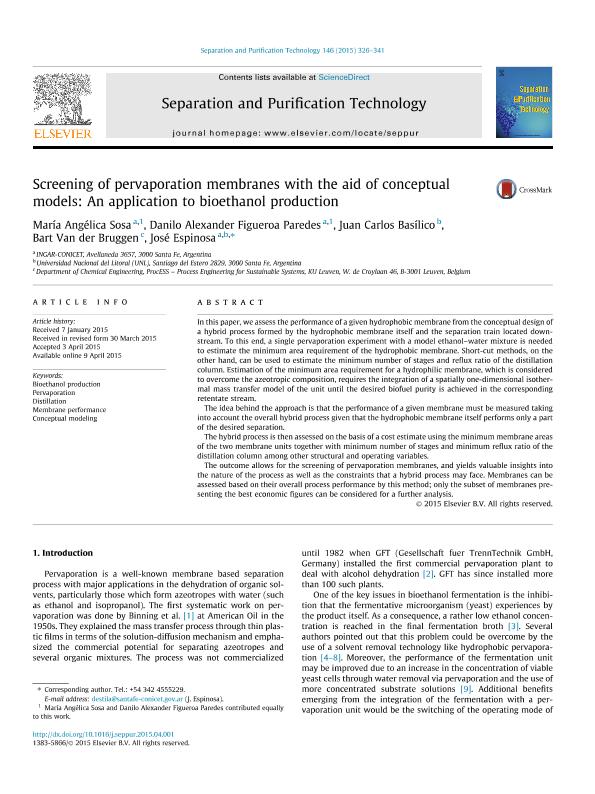Mostrar el registro sencillo del ítem
dc.contributor.author
Sosa, María Angélica

dc.contributor.author
Figueroa Paredes, Danilo Alexander

dc.contributor.author
Basilico, Juan Carlos

dc.contributor.author
Van der Bruggen, Bart
dc.contributor.author
Espinosa, Hector Jose Maria

dc.date.available
2017-08-18T21:47:23Z
dc.date.issued
2015-05
dc.identifier.citation
Sosa, María Angélica; Figueroa Paredes, Danilo Alexander; Basilico, Juan Carlos; Van der Bruggen, Bart; Espinosa, Hector Jose Maria; Screening of pervaporation membranes with the aid of conceptual models: An application to bioethanol production; Elsevier; Separation and Purification Technology; 146; 5-2015; 326-341
dc.identifier.issn
1383-5866
dc.identifier.uri
http://hdl.handle.net/11336/22737
dc.description.abstract
In this paper, we assess the performance of a given hydrophobic membrane from the conceptual design of a hybrid process formed by the hydrophobic membrane itself and the separation train located downstream. To this end, a single pervaporation experiment with a model ethanol?water mixture is needed to estimate the minimum area requirement of the hydrophobic membrane. Short-cut methods, on the other hand, can be used to estimate the minimum number of stages and reflux ratio of the distillation column. Estimation of the minimum area requirement for a hydrophilic membrane, which is considered to overcome the azeotropic composition, requires the integration of a spatially one-dimensional isothermal mass transfer model of the unit until the desired biofuel purity is achieved in the corresponding retentate stream.The idea behind the approach is that the performance of a given membrane must be measured taking into account the overall hybrid process given that the hydrophobic membrane itself performs only a part of the desired separation.The hybrid process is then assessed on the basis of a cost estimate using the minimum membrane areas of the two membrane units together with minimum number of stages and minimum reflux ratio of the distillation column among other structural and operating variables.The outcome allows for the screening of pervaporation membranes, and yields valuable insights into the nature of the process as well as the constraints that a hybrid process may face. Membranes can be assessed based on their overall process performance by this method; only the subset of membranes presenting the best economic figures can be considered for a further analysis.
dc.format
application/pdf
dc.language.iso
eng
dc.publisher
Elsevier

dc.rights
info:eu-repo/semantics/openAccess
dc.rights.uri
https://creativecommons.org/licenses/by-nc-sa/2.5/ar/
dc.subject
Bioethanol Production
dc.subject
Pervaporation
dc.subject
Distillation
dc.subject
Membrane Performance
dc.subject
Conceptual Modeling
dc.subject.classification
Otras Ingeniería Química

dc.subject.classification
Ingeniería Química

dc.subject.classification
INGENIERÍAS Y TECNOLOGÍAS

dc.title
Screening of pervaporation membranes with the aid of conceptual models: An application to bioethanol production
dc.type
info:eu-repo/semantics/article
dc.type
info:ar-repo/semantics/artículo
dc.type
info:eu-repo/semantics/publishedVersion
dc.date.updated
2017-08-04T15:41:28Z
dc.journal.volume
146
dc.journal.pagination
326-341
dc.journal.pais
Países Bajos

dc.journal.ciudad
Amsterdam
dc.description.fil
Fil: Sosa, María Angélica. Consejo Nacional de Investigaciones Científicas y Técnicas. Centro Científico Tecnológico Conicet - Santa Fe. Instituto de Desarrollo y Diseño. Universidad Tecnológica Nacional. Facultad Regional Santa Fe. Instituto de Desarrollo y Diseño; Argentina
dc.description.fil
Fil: Figueroa Paredes, Danilo Alexander. Consejo Nacional de Investigaciones Científicas y Técnicas. Centro Científico Tecnológico Conicet - Santa Fe. Instituto de Desarrollo y Diseño. Universidad Tecnológica Nacional. Facultad Regional Santa Fe. Instituto de Desarrollo y Diseño; Argentina
dc.description.fil
Fil: Basilico, Juan Carlos. Universidad Nacional del Litoral; Argentina
dc.description.fil
Fil: Van der Bruggen, Bart. Department of Chemical Engineering, ProcESS – Process Engineering for Sustainable Systems; Bélgica
dc.description.fil
Fil: Espinosa, Hector Jose Maria. Consejo Nacional de Investigaciones Científicas y Técnicas. Centro Científico Tecnológico Conicet - Santa Fe. Instituto de Desarrollo y Diseño. Universidad Tecnológica Nacional. Facultad Regional Santa Fe. Instituto de Desarrollo y Diseño; Argentina
dc.journal.title
Separation and Purification Technology

dc.relation.alternativeid
info:eu-repo/semantics/altIdentifier/url/www.sciencedirect.com/science/article/pii/S1383586615002245
dc.relation.alternativeid
info:eu-repo/semantics/altIdentifier/doi/http://dx.doi.org/10.1016/j.seppur.2015.04.001
Archivos asociados
